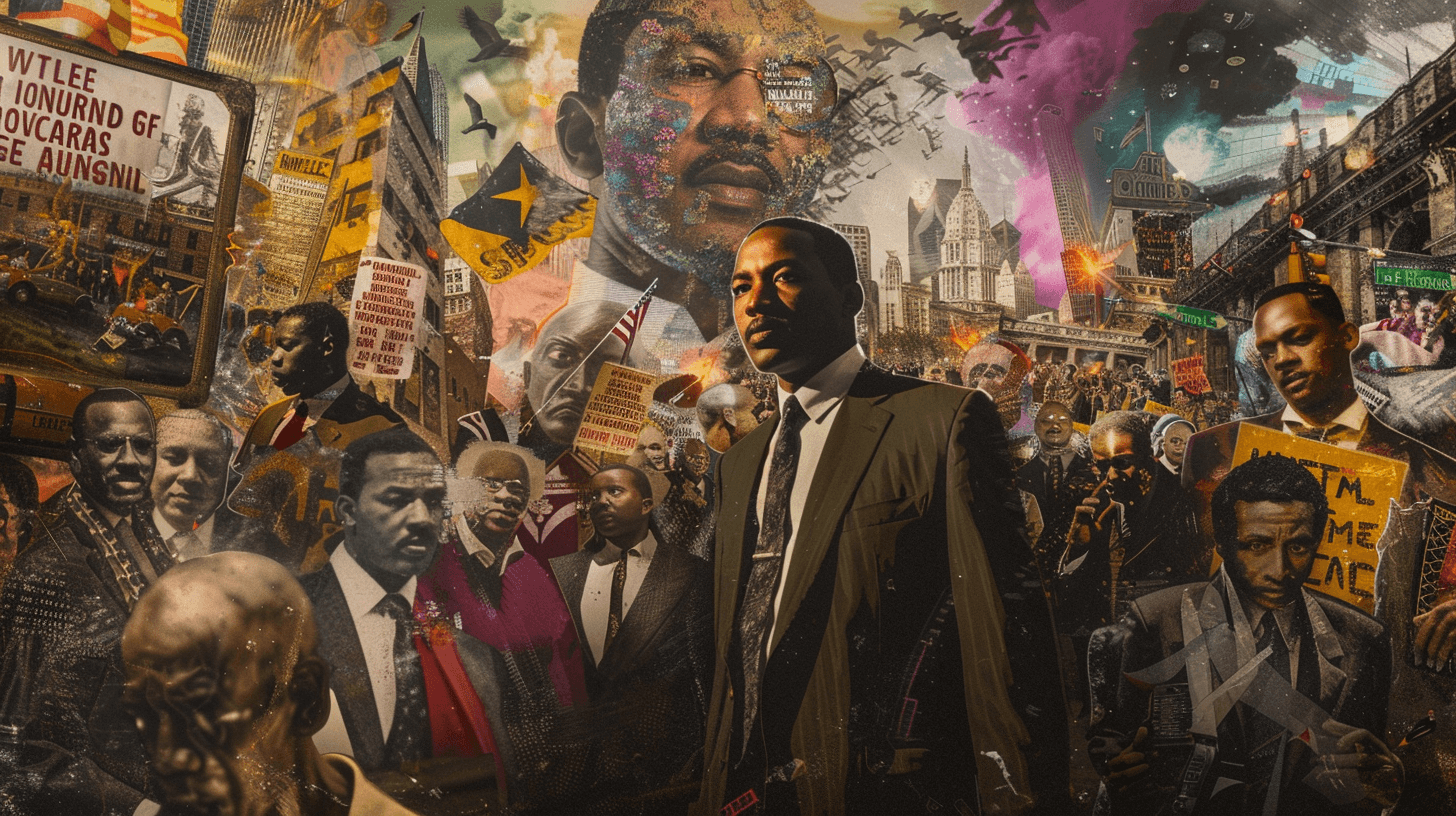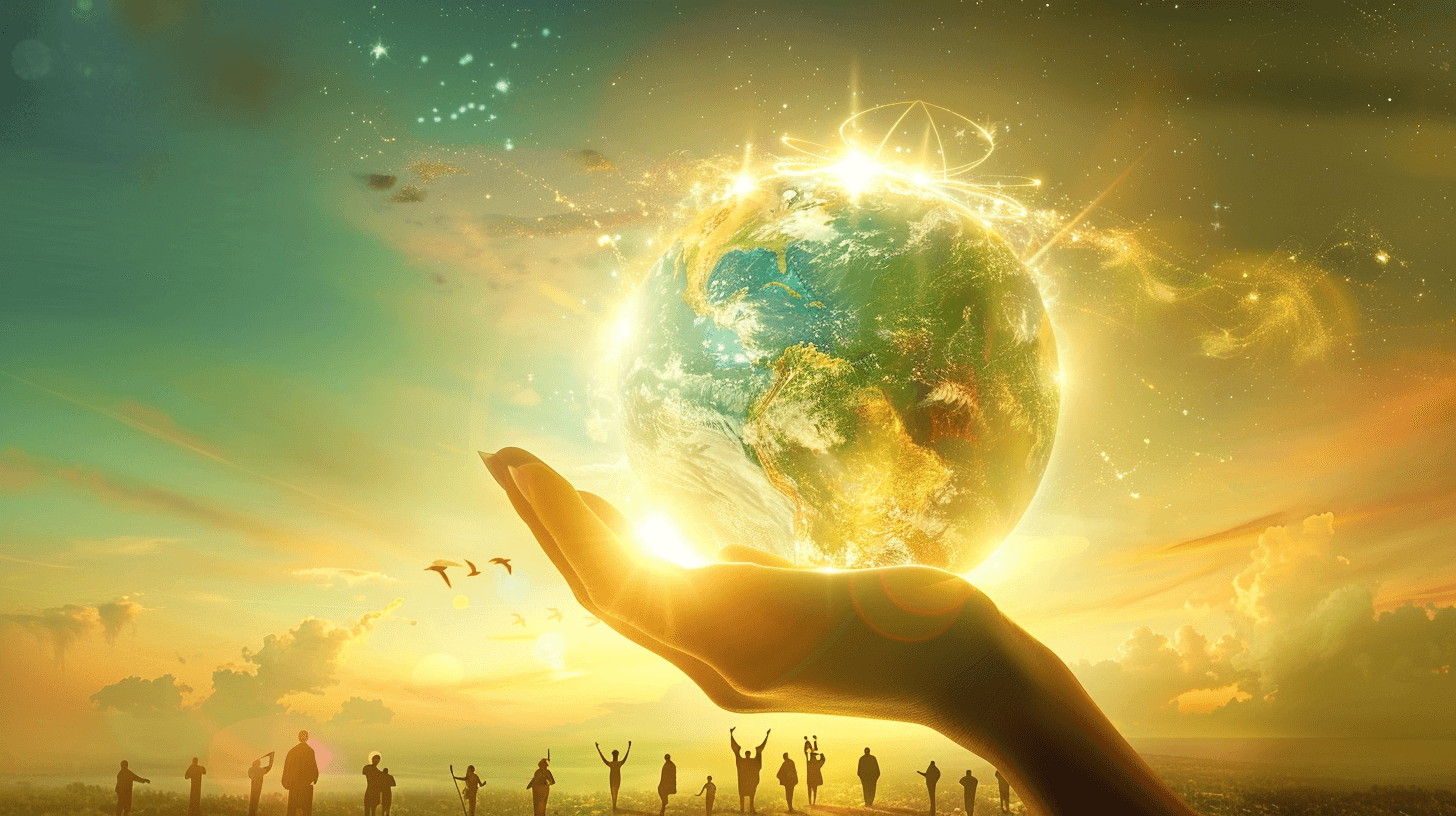Introduction: The Power of Spirituality in Global Transformation

In an era where the challenges facing humanity—climate change, social injustice, economic disparity—seem overwhelming, the quest for solutions often leads us back to the basics of human existence: our values, our ethics, and ultimately, our spirituality. Spirituality, when understood and applied thoughtfully, has the potential to be a transformative force, not just for individual growth but for societal change.
But what does it truly mean to build a better world through spirituality? The concept goes beyond personal enlightenment; it involves using spiritual principles to influence and shape the world around us positively. This article deconstructs the idea of spiritual-driven global change, providing a fresh, evidence-based perspective on how spirituality can be a catalyst for building a more just, compassionate, and sustainable world. We’ll explore the connection between spirituality and social change, delve into essential books that offer guidance on this journey, and present practical ways to integrate these teachings into everyday life.
By the end of this guide, you’ll not only have a deeper understanding of spirituality’s role in global transformation but also practical tools to start making a difference—one spiritual practice, one community effort, and one mindful decision at a time.
Understanding the Connection Between Spirituality and Social Change

To understand how spirituality can contribute to building a better world, we must first deconstruct what we mean by “spirituality.” Traditionally, spirituality has been seen as a deeply personal, often private pursuit of inner peace, enlightenment, or connection with the divine. However, this conventional view limits the potential of spirituality to influence broader societal change.
When viewed through the lens of first principles thinking, spirituality can be redefined as the conscious pursuit of understanding, integrating, and embodying the fundamental truths of existence. These truths are not confined to religious doctrines but are universal principles that govern human well-being and societal harmony—principles like compassion, interconnectedness, ethical living, and the pursuit of a higher purpose.
Historically, spirituality has been at the heart of many social movements. The Civil Rights Movement in the United States, for example, was deeply rooted in the spiritual teachings of nonviolence and love espoused by leaders like Martin Luther King Jr., who drew on Christian principles and the philosophy of Mahatma Gandhi. Gandhi’s nonviolent resistance, or Satyagraha, was itself a manifestation of his spiritual beliefs in truth and nonviolence.
These examples show that spirituality, when applied to societal issues, can inspire profound change. It provides a moral framework that transcends politics and economics, appealing to our shared humanity and the higher ideals that bind us together.
In the modern context, the intersection of spirituality and social change is more relevant than ever. As global challenges become more complex and interconnected, there is a growing recognition that solutions must also be holistic—addressing not just the symptoms but the underlying causes of societal dysfunction. Spirituality, with its emphasis on inner transformation and ethical living, offers a path toward such holistic solutions.
Today’s spiritual movements are increasingly focused on global issues like climate change, social justice, and economic inequality. The rise of eco-spirituality, for example, emphasizes the sacredness of the Earth and the moral responsibility to protect it. Similarly, movements for social justice often draw on spiritual teachings that advocate for the dignity and equality of all people.
Top Books for Building a Better World Through Spirituality

Books have long been a source of wisdom and guidance for those seeking to understand and apply spiritual principles to real-world challenges. The following books are essential reading for anyone interested in using spirituality to build a better world:
“The Power of Now” by Eckhart Tolle
Summary: This seminal work emphasizes the importance of living in the present moment as a way to transcend the ego and connect with a deeper, more universal consciousness. Tolle argues that by shifting our focus away from the past and future and instead anchoring ourselves in the present, we can achieve a state of inner peace that naturally extends to our interactions with others and the world.
Key Takeaways: “The Power of Now” provides practical guidance on how to break free from the mental constructs that limit our consciousness and how this shift can lead to more compassionate and responsible behavior, which is essential for building a better world.
“A New Earth: Awakening to Your Life’s Purpose” by Eckhart Tolle
Summary: In this follow-up to “The Power of Now,” Tolle explores how individuals can awaken to a new state of consciousness that goes beyond personal enlightenment to contribute to a collective transformation. The book emphasizes the need for a shift in consciousness to overcome the ego-driven behaviors that have led to many of the world’s current challenges.
Key Takeaways: “A New Earth” offers a blueprint for how individuals can contribute to a global awakening by aligning their actions with a higher purpose, thus creating a ripple effect that can lead to societal change.
“Becoming Supernatural” by Dr. Joe Dispenza
Summary: This book combines scientific insights with spiritual wisdom, exploring how individuals can use meditation and visualization to reach higher states of being. Dispenza provides evidence that our thoughts and emotions can influence our reality, and by mastering these, we can create positive change in both our personal lives and the world.
Key Takeaways: “Becoming Supernatural” empowers readers with the tools to transform their internal state, which in turn affects the external world. The book’s emphasis on the connection between consciousness and reality makes it a valuable resource for those looking to apply spiritual principles to societal challenges.
“The Untethered Soul: The Journey Beyond Yourself” by Michael A. Singer
Summary: Singer offers a deep exploration of consciousness, discussing how to free oneself from habitual thoughts and emotions to experience a more expansive state of awareness. The book encourages readers to let go of their inner limitations, which can open the door to more meaningful contributions to the world.
Key Takeaways: “The Untethered Soul” provides practical advice on how to transcend the inner obstacles that prevent us from living fully and contributing positively to society. It’s a guide to personal liberation that has broader implications for social change.
“Waking Up: A Guide to Spirituality Without Religion” by Sam Harris
Summary: Harris presents a rational approach to spirituality, discussing how mindfulness and meditation can lead to profound shifts in consciousness without the need for religious frameworks. The book is particularly valuable for those who seek a secular path to spiritual growth and social contribution.
Key Takeaways: “Waking Up” offers an accessible entry point into spirituality for those who may be skeptical of traditional religious practices but still recognize the need for inner transformation as a foundation for societal change.
“The Seat of the Soul” by Gary Zukav
Summary: Zukav’s book explores the connection between the soul and the personality, offering insights into how aligning with one’s true self can lead to spiritual growth and higher consciousness. The book suggests that this alignment is essential for creating a more just and compassionate world.
Key Takeaways: “The Seat of the Soul” emphasizes the importance of living in alignment with one’s soul’s purpose, which Zukav argues is crucial for both personal fulfillment and contributing to the greater good.
“Conversations with God” by Neale Donald Walsch
Summary: This book presents a dialogue between the author and God, offering unique perspectives on life’s biggest questions and encouraging readers to explore their own spiritual consciousness. The conversations touch on themes of unity, love, and the interconnectedness of all life, which are essential principles for building a better world.
Key Takeaways: “Conversations with God” challenges readers to rethink their relationship with the divine and their role in the world, providing inspiration for those who want to make a positive impact through spiritual practice.
How to Choose the Right Book:
Choosing the right book depends on where you are in your spiritual journey and what specific aspects of spirituality and social change resonate with you. Whether you’re looking for practical advice on meditation and mindfulness, a deeper philosophical exploration of consciousness, or guidance on how to align your life with a higher purpose, the books listed above offer a range of perspectives to help you on your path.
Practical Spiritual Practices for Global Impact

Meditation and Mindfulness:
Meditation and mindfulness are foundational practices for anyone seeking to elevate their consciousness and contribute to a better world. These practices help individuals develop a heightened sense of awareness, allowing them to act with greater intention and compassion in their daily lives.
Meditation, in particular, has been shown to reduce stress, improve emotional regulation, and enhance empathy—all of which are crucial for building stronger, more harmonious communities. Mindfulness, the practice of being fully present in each moment, helps individuals avoid reactive behaviors and make decisions that are aligned with their values.
Service and Compassion:
One of the most powerful ways to apply spirituality to social change is through service and compassion. The spiritual principle of Seva, or selfless service, encourages individuals to act for the benefit of others without expecting anything in return. This practice not only benefits those who receive the service but also deepens the spiritual growth of the giver.
Acts of compassion, whether large or small, create ripple effects that can transform communities. Whether it’s volunteering at a local charity, helping a neighbor in need, or simply offering a kind word, these actions contribute to the collective consciousness and foster a sense of interconnectedness.
Conscious Consumerism:
Conscious consumerism is the practice of making purchasing decisions that reflect one’s spiritual and ethical values. This includes supporting companies that prioritize sustainability, fair labor practices, and social responsibility. By aligning their consumption habits with their spiritual beliefs, individuals can drive demand for products and services that contribute to a better world.
This practice also extends to reducing consumption and embracing a minimalist lifestyle, which is often aligned with spiritual teachings that emphasize detachment from materialism and the importance of living simply and mindfully.
Community Building:
Spirituality is not just an individual pursuit; it is also a collective experience. Building communities that share common spiritual values can amplify the impact of individual efforts. These communities can serve as support networks, places for learning and growth, and platforms for collective action.
Whether through spiritual groups, social justice organizations, or local initiatives, community building is a vital aspect of using spirituality to create social change. These communities provide a space for individuals to come together, share their experiences, and work towards common goals.
Case Studies: Spiritual Movements that Changed the World

Gandhi’s Nonviolent Resistance:
Mahatma Gandhi’s philosophy of nonviolent resistance, or Satyagraha, is one of the most powerful examples of spirituality in action. Rooted in the spiritual principles of Ahimsa (nonviolence) and Satya (truth), Gandhi’s approach to social and political change was grounded in the belief that true power comes from moral authority, not physical force.
Gandhi’s spiritual practices, including daily meditation, fasting, and prayer, were integral to his leadership and his ability to inspire millions to join his movement. His success in leading India to independence from British rule without resorting to violence has made Satyagraha a model for other social movements worldwide, including the Civil Rights Movement in the United States.
Martin Luther King Jr. and the Civil Rights Movement:
Dr. Martin Luther King Jr. drew heavily on his Christian faith and the teachings of Gandhi to lead the Civil Rights Movement. King’s spirituality was central to his vision of a just society and his strategy of nonviolent resistance. He believed that love and nonviolence were not only moral imperatives but also powerful tools for social change.
King’s famous “I Have a Dream” speech, his leadership during the Montgomery Bus Boycott, and his role in the March on Washington all demonstrated how spiritual principles could be harnessed to confront systemic injustice and bring about profound societal transformation. His legacy continues to inspire movements for social justice around the world.
Environmental Activism and Indigenous Spirituality:
Indigenous spiritual practices, which emphasize the sacredness of the Earth and the interconnectedness of all life, have been at the forefront of environmental activism. Movements like the Standing Rock protests against the Dakota Access Pipeline have drawn global attention to the environmental and spiritual concerns of indigenous peoples.
These movements are not just about protecting land and water; they are about preserving a way of life that respects and honors the natural world. Indigenous spirituality provides a powerful framework for understanding our relationship with the Earth and our responsibility to protect it for future generations.
Global Peace Movements and Interfaith Dialogue:
In the aftermath of global conflicts, interfaith dialogue has emerged as a vital tool for promoting peace and understanding between different religious and cultural groups. Organizations like the United Religions Initiative (URI) and the Parliament of the World’s Religions bring together leaders from diverse spiritual traditions to work towards common goals of peace, justice, and sustainability.
These movements recognize that spirituality can be a unifying force, transcending cultural and religious differences to foster global cooperation and understanding. By focusing on shared values such as compassion, justice, and respect for the Earth, interfaith dialogue contributes to building a more peaceful and harmonious world.
The Future of Spirituality in Social Change

As we look towards the future, several emerging trends suggest that spirituality will continue to play a critical role in addressing global challenges. One such trend is the rise of eco-spirituality, which combines environmental activism with spiritual practices that honor the Earth as a sacred being. This movement is gaining momentum as more people recognize the urgent need to address climate change and environmental degradation through a spiritual lens.
Another trend is the increasing use of digital technology and artificial intelligence in spiritual practices. Apps, online communities, and AI-driven tools are making spiritual resources more accessible to people around the world. These technologies are not only helping individuals deepen their spiritual practices but are also connecting them with like-minded communities focused on social change.
The Role of Millennials and Gen Z:
Millennials and Gen Z are at the forefront of these trends, driving a shift towards more inclusive, intersectional, and action-oriented forms of spirituality. These generations are more likely to engage in spiritual practices outside traditional religious institutions, seeking out personalized, holistic approaches that align with their values of social justice, environmental sustainability, and global interconnectedness.
Their influence is shaping the future of spirituality, making it more relevant to the challenges of the 21st century. As these generations continue to advocate for systemic change, their spiritually-driven activism is likely to have a profound impact on the global stage.
The future of spirituality in social change is bright, but it requires a collective effort to realize its full potential. As more individuals and communities embrace spiritual practices that promote compassion, justice, and sustainability, we can expect to see a growing movement towards a more just and peaceful world.
However, this vision also depends on our willingness to challenge and rethink conventional assumptions about spirituality. It requires a commitment to integrating spiritual principles into every aspect of our lives—from the personal to the political—and to using these principles as a guide for our actions in the world.
The journey towards building a better world through spirituality begins with each of us. Whether through reading one of the recommended books, adopting a new spiritual practice, or getting involved in community activism, there are countless ways to contribute to this movement. The key is to start where you are, with the resources and tools available to you, and to commit to the ongoing process of growth and transformation.
Together, we can harness the power of spirituality to create a world that reflects our highest ideals—a world where compassion, justice, and respect for all life are the guiding principles of society.
Conclusion: Embracing Spirituality as a Catalyst for Global Change

As we’ve explored in this guide, spirituality is not just a personal journey; it is a powerful force for social change. By understanding the deep connection between spirituality and societal transformation, we can begin to see how our spiritual practices contribute not only to our own growth but also to the betterment of the world around us.
The books, practices, and movements discussed in this article provide a roadmap for those who wish to use their spirituality as a catalyst for global change. They offer practical tools and inspiring examples of how spiritual principles can be applied to address the most pressing challenges of our time.
Ultimately, building a better world through spirituality requires a shift in consciousness—from seeing ourselves as separate from the world to recognizing our interconnectedness with all life. It calls for a commitment to living in alignment with our highest values and to taking action that reflects our spiritual beliefs.
This journey is not always easy, but it is profoundly rewarding. As we embrace spirituality as a catalyst for global change, we open ourselves to new possibilities for personal and collective transformation. We begin to see that the world we envision—a world of peace, justice, and sustainability—is within our reach, and that each of us has a role to play in making it a reality.







